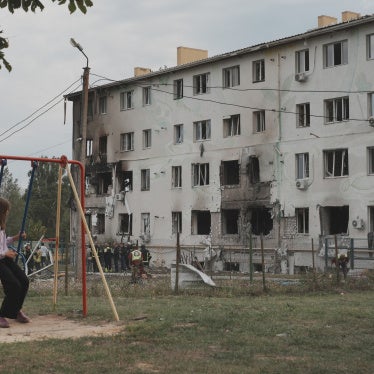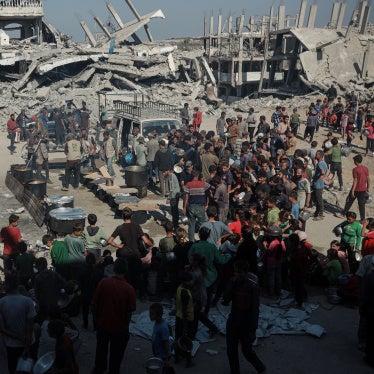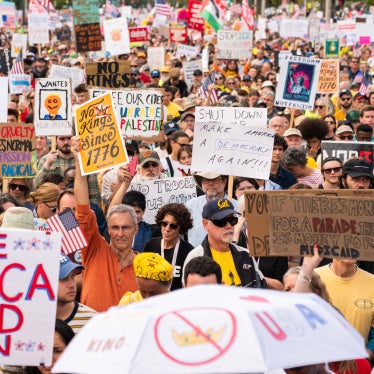In 2010 Russia appeared to improve its standing in the international arena by expanding its cooperation on human rights issues with international institutions and delegations. This was manifested in particular in the long-awaited adoption of Protocol 14 to the European Convention on Human Rights and the unprecedented endorsement by the Russian delegation to PACE of a very critical report on the human rights situation in the North Caucasus. However, the human rights climate in the country remains hostile. President Dmitry Medvedev's rhetorical commitments to human rights and rule of law and the government's seeming openness to international scrutiny have not been backed by concrete steps to ensure a vibrant civil society and improve Russia's compliance with its international human rights obligations.
Modernization
The Kremlin's professed commitment to modernization is welcome and sorely needed to overcome the lack of transparency in government operations, and the evident flaws in the work of key state institutions. But the authorities have shown no sign of abating pressure on independent media and civic society organizations or of moving away from authoritarian style of governance; this is inconsistent with a modernization agenda.
Violence and arbitrary actions by law enforcement agencies represent a crucial obstacle on the path to modernization and serve to widen the gap between the authorities and the public. The need for police reform, clearly articulated by various groups in Russian society, has been at the center of national debate. Responding to public outcry, the government pledged to launch major law enforcement reform. However, no comprehensive reform concept has been elaborated as of yet. The new draft law on police proposed by the authorities has been criticized by human rights groups as inadequate, in particular from the viewpoint of putting an end to police torture and lawlessness.
The European Union should encourage the Russian government to involve civil society organizations in developing an across-the-board law enforcement reform targeted towards protecting the fundamental human rights of individuals and providing for participation of civil society in overseeing and evaluating the work of law enforcement agencies.
Russian NGOs and the independent media remain vulnerable to bureaucratic harassment and unfounded criminal lawsuits aimed at intimidating them. The authorities need to demonstratively stop these practices and also repeal onerous and vague regulations that make them possible. Instead, the government has strengthened its harassment toolbox. For years, the government has used anti-extremist laws to silence its independent critics. In 2010, the authorities had the parliament amend the national law on the Federal Security Service (FSB), allowing the FSB to issue warnings to individuals, organizations, and media outlets. The warnings will require relevant individuals or organizations to cease activities that the special services unilaterally decide are extremist or potentially extremist.
The working group on reforms to the restrictive 2006 law on NGOs, set up in 2009 with a presidential decree, has failed so far to resolve the issue of cumbersome reporting requirements and excessive audits for NGOs. In fact, this month the Prosecutor General's office launched a massive and unprecedented wave of intrusive checks into the activities of foreign-funded NGOs.
The European Union should urge the Russian government to amend laws on the FSB, NGOs, and extremism so that they can be used to foster, rather than suppress, civil society.
Widespread abuses against migrant workers-including denial of contracts, non-payment or delayed payment of wages, excessively long working hours, and unsafe working conditions-are also inconsistent with a modernization agenda. Russian regulations place many barriers for migrants, particularly those coming from countries under the non-visa regime, to regularize their stay and working in Russia. This results in large numbers of migrant workers with irregular migration or work permit status; they are most vulnerable to abuses. The Russian government is currently seeking to better integrate migrant workers in Russian society. It needs to be convinced that a key first step to integration is ensuring that migrant workers can live and work without hindrance in accordance with Russia law.
The Russian authorities should be urged to simplify and rationalize the process for migrant workers to live and work in Russia legally and hold abusive employers accountable. These steps would help reduce abuses and increase tax revenues to the Russian economy.
President Medvedev's modernization rhetoric appears to be particularly unconvincing in view of the Kremlin's failure to alter its counterterrorism policies and to confront increasingly negative human rights developments in the North Caucasus. In early 2010, very much consistent with a modernization agenda, Prime Minister Vladimir Putin and others leaders made unprecedented acknowledgments that terrorism and insurgency in the North Caucasus could not be overcome without addressing the region's economic woes, in particular staggering corruption. But the Kremlin's approach to counterinsurgency and counterterrorism in the North Caucasus continues to rely heavily on arbitrary detention, torture and collective punishment. The latter is particularly glaring, as this year high-level Chechen officials, including Chechnya's leader, Ramzan Kadyrov, have been systematically making public statements stressing that insurgents' families should expect punishment unless their relatives surrender. Rampant impunity for abuses antagonizes the population in Chechnya, Ingushetia and Dagestan, and results in further deterioration of the situation on the ground.
Local authorities in Chechnya also gave unambiguous approval to the pelting of uncovered women on the streets with paintball guns, which this summer resulted in the hospitalization of at least one woman. In his interview to "Grozny" television station on July 3, the Chechen leader, Kadyrov professed his readiness to "award a commendation" to the men engaged in this crime. He also stated that the targeted women deserved such treatment for not being dressed with sufficient modesty. This autumn, Human Rights Watch received numerous reports from Chechnya about women being harassed in the streets of Grozny for not covering their hair or wearing clothes deemed too revealing. The Chechen authorities have banned women refusing to wear headscarves from working in the public sector; the same applies to female students of schools and universities.
The European Union should call on the Russian government to publicly disavow unlawful counterterrorism/counterinsurgency practices, acknowledge the role they play in destabilizing the situation in the region, and hold accountable those who engage in them. Russia should also put an end to local rules forcing women in Chechnya to observe an Islamic dress code and instead act to protect women's right to private life and personal autonomy.
Russia's failure to fully implement the judgments of the European Court of Human Rights (ECtHR) on applications from Chechnya contributes to the climate of impunity both in the republic and in the North Caucasus region as a whole. To date, the ECtHR has issued over 150 judgments on Chechen cases holding Russia responsible for violating its fundamental human rights obligations. Russia cooperates with the court by paying out the required monetary compensation to the victims but fails to conduct an effective investigation and hold the actual perpetrators accountable even in cases where their identity is known. Also, the authorities do not take measures to prevent similar abuses from re-occurring. New complaints from Chechnya and similar cases from Dagestan and Ingushetia continue to be lodged with the ECtHR.
The European Union should prioritize the issue of implementation of ECtHR rulings in its dialogue with Russia and make the topic a standalone item on the agenda of the EU-Russia human rights consultations.
Human Rights Defenders
Among Russia's human rights defenders, those trying to put an end to impunity in the North Caucasus are especially vulnerable. On January 23, 2010, Prime Minister Putin urged the authorities in the North Caucasus to "do everything to support the normal work and daily activities of rights-defending organizations" in the region. Unfortunately, despite this unprecedented statement - which reflects consolidated pressure by Russia's international partners - official harassment and threats against human rights defenders continue.
Oleg Orlov, chairman of the Memorial Human Rights Center, one of Russia's leading rights groups, was charged with slander and faces up to three years in prison. The charges stem from Orlov's statement suggesting that Chechen leader Ramzan Kadyrov was responsible for the July 2009 murder of Natalia Estemirova, a leading human rights defender in Chechnya and a researcher with Memorial. The investigation into the killing has not been transparent and it is unclear which steps, if any, have been taken by the investigators to examine possible official involvement or acquiescence in the crime.
Estemirova's murder and threats against several other staff-members led to a six-month suspension of Memorial's work in Chechnya. In 2009, three of the activists at risk had to be evacuated from the region with their families. Twelve Russian human rights organizations under the leadership of the Nizhny Novgorod Committee Against Torture established mobile working groups to help Memorial monitor and investigate human rights violations in the republic. In the course of 2010, activists from different regions of Russia have been working on the ground by rotation, providing legal assistance to victims of violations by law enforcement agencies.
In February 2010 a group of three activists deployed in Chechnya was arbitrarily detained in the Shali district, held in police custody overnight and interrogated without access to legal counsel. The police unlawfully seized and damaged some of their equipment. The investigation into their subsequent complaint about the incident yielded no tangible results.
On May 19, at a meeting with the main human rights organizations working in the republics of the North Caucasus, President Medvedev repeatedly stated that the local authorities must closely cooperate with civil society organizations. These commitments were welcomed by Human Rights Watch and Memorial, who took part in the event and spoke about impunity for rampant human rights abuses in the region. However, Ramzan Kadyrov and other high-level Chechen officials continued making threatening statements about their critics. In a little less than month after the meeting with President Medvedyev, Kadyrov described human rights defenders and Memorial activists in particular as "enemies of the state, enemies of the people, enemies of the law." The Kremlin has not reacted to this statement in any way.
Rights activists in Dagestan, particularly the Mothers of Dagestan for Human Rights continue receiving threats. A prominent human rights lawyer form Dagestan, Sapiyat Magomedova, was severely beaten by police in Khasavyurt in summer 2010 and the perpetrators of this crime have not been held to account.
Assaults and intimidation of human rights defenders are not limited to the North Caucasus region. In February 2010 authorities in Novorossisk held Vadim Karastelev, a human rights advocate, for seven days of administrative arrest for organizing a demonstration. The day after Karastelev's release, unknown assailants brutally beat him, causing serious injuries. The police investigation into the attack has not yielded any tangible results.
In May 2010 a court in the Sverdlovsk region sentenced Alexei Sokolov, a prisoners' rights advocate from Ekaterinburg, to five years in a high-security prison. Theft and robbery charges brought against him appear a probable retaliation for his activities.
Public rallies in support of freedom of assembly held in Moscow and other large cities on the 31st day of every month that has 31 days (article 31 of the Russian constitution guarantees the right to peaceful assembly), continue to be dispersed by police, sometimes violently. The year started with the detention Russia's leading human rights defender, Ludmila Alexeeva, then age 82, at such a rally in Moscow on New Year's Eve. The authorities routinely refuse to officially sanction the rallies and then sue the participants for supposedly unlawful activity. Lev Ponomarev, a prominent human rights activist, was twice sentenced to administrative arrest in 2010 in connection with his participation in rallies. Amnesty International recognized him as a prisoner of conscience.
The European Union should call on the Russian government to put an end to the persecution of human rights defenders, cease interfering with the right to peaceful assembly, and take concrete steps to foster a normal working environment for civil society organizations and activists.






